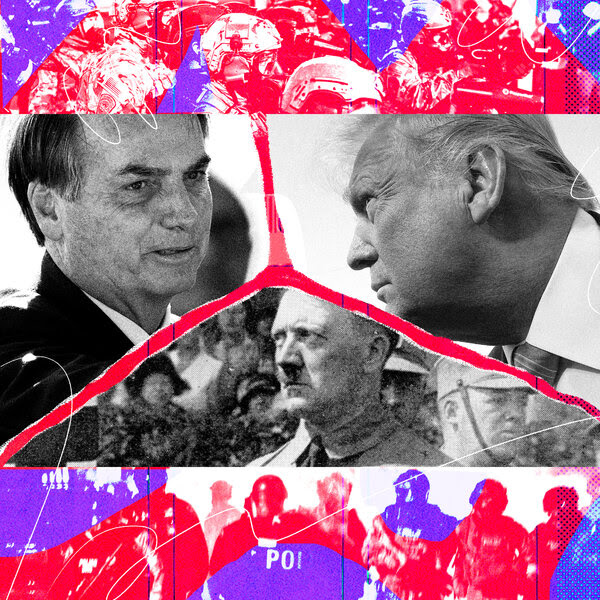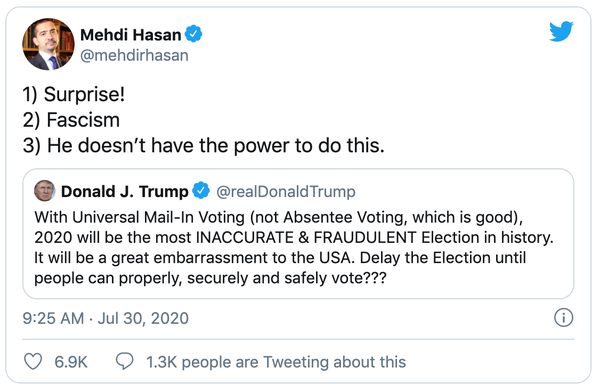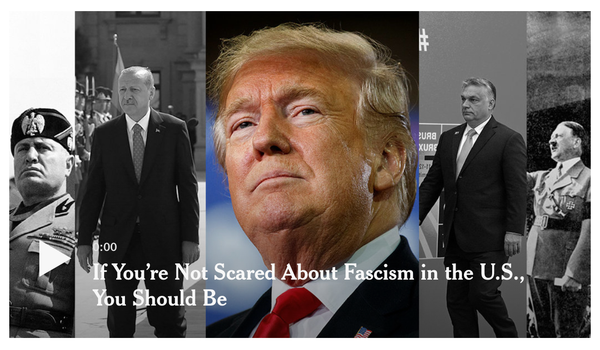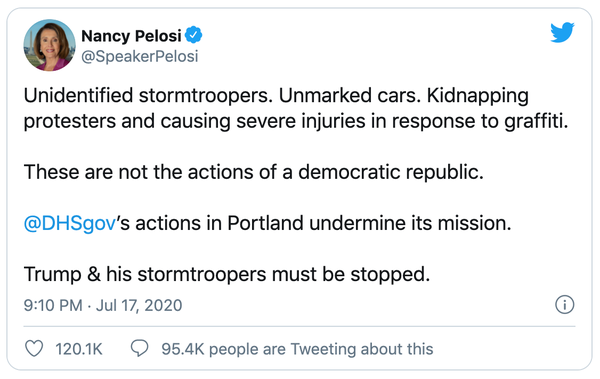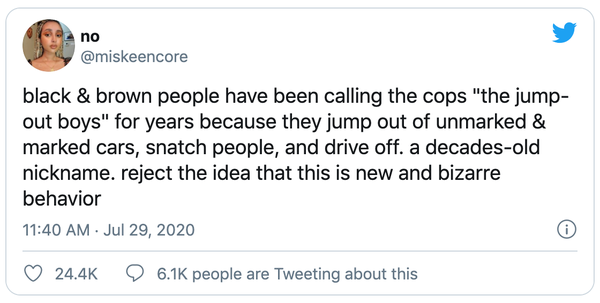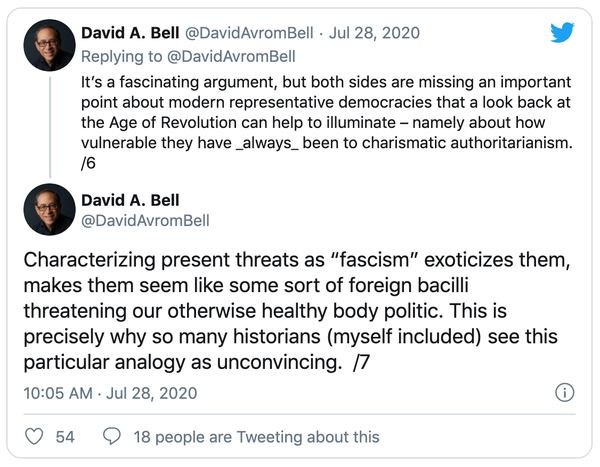View in browser|
nytimes.com
Continue reading the main story

July 30, 2020
From left, Jair Bolsonaro, Adolf Hitler and Donald Trump.Illustration by The New York Times; photographs by Stefani Reynolds, Christopher Lee for The New York Times, Joedson Alves/EPA, via Shutterstock, and Getty Images

By
Spencer Bokat-Lindell
Staff Editor, Opinion
In a tweet on Thursday morning, President Trump floated the very bad idea of
delaying the presidential election. (He does not have the legal authority to do so, though that doesn’t mean there are no reasons for concern —
more on those here.) Within hours, the president’s statement was being condemned, by
conservatives and
progressives alike, as fascism.
Twitter
It’s a word that’s been
appearing with
increasing frequency recently, including in
The Times. But what does fascism actually mean? To what extent can American politics, present and past, be described as fascist? And is it even a useful word anymore? Here’s what people are saying.
How fascism works
The New York Times
[Watch: “When fascism starts to feel normal, we’re all in trouble.”]
The word fascism has become so freighted with meaning that it can be difficult to define; today, it is often used as a shallow epithet for any politics one strongly dislikes. As a historical term, however, fascism refers to the current of far-right, anti-democratic ultranationalism that coursed through Europe in the interwar period. Although primarily associated with Adolf Hitler, fascism first gained form as a paramilitary and political movement under Benito Mussolini in 1919. The name of Mussolini’s party derived from
“fasces,” the Latin word for a bundle of wooden rods containing an ax that symbolized power in ancient Rome, and which Mussolini used to represent the Italian people bound by the authority of the state.
Continue reading the main story
ADVERTISEMENT



A fascist government, as Ruth Ben-Ghiat, a historian of authoritarianism at New York University,
explains, has only one party, led by a dictator who through violence has shut down all opposition, including from the judiciary, the press and so-called enemies of the state.
[Read More: “Donald Trump and Benito Mussolini”]
But what makes fascism distinct from other forms of authoritarianism? Here are a few signature characteristics according to Jason Stanley, a philosophy professor at Yale and the author of
“How Fascism Works.”
- The mythic past: Fascism appeals to an imaginary and glorious past destroyed by the forces of liberalism, cosmopolitanism and globalism. The fantasy of a uniform past can take on multiple dimensions — racial, cultural, religious — but it is invariably patriarchal. The enshrinement of traditional gender roles lends moral authority to the strongman to impose his will on the present.
- “Us” vs. “them”: Through appeals to the mythic past, fascism establishes a hierarchy of human worth: e.g., law-abiding over criminal, hard-working over lazy, racially pure over impure, heterosexual over homosexual, abled over disabled. Those deemed worthy are considered the nation’s true people, or in German, the “Volk.” Those deemed unworthy are singled out as threats to the Volk, “straw men and women ready to be cast into the roles of rapists, murderers, terrorists.”
- Unreality: False distinctions between worthy and unworthy populations are enforced through propaganda and anti-intellectualism that corrode shared reality, degrade language and create fertile ground for conspiracy theories to flourish. Crucially, as Hannah Arendt wrote, the hallmark of fascist propaganda is not just that it promotes lies, which is characteristic of propaganda in general, but that it promotes lies in service of policy that seeks to make them true.
- Atomization: While fascist movements emphasize certain collective identities, they also tend to promote a social Darwinist ethic, according to which the individual must struggle against others for power and resources in free-market competition. Class divisions must therefore be minimized through the dismantling of labor movements and unions, possessing as they do the potential to promote solidarity across differences that fascism depends on exploiting. That fascism is most effective in times of severe economic inequality is another reason it targets labor unions.
Is America slipping into fascism?
Critics of President Trump have described him as
promoting fascism since before he won the 2016 election. But the accusations have gained new force in recent months with the deployment of federal law enforcement in
Washington, D.C.;
Portland, Ore.; and
potentially elsewhere to disperse protests, sometimes brutalizing
protesters,
journalists and
politicians in the process.
Continue reading the main story
ADVERTISEMENT



America, of course, does not have a one-party government, and it is still holding elections (though fears about their
future legitimacy abound), so it cannot credibly be called a fascist state. But do recent events bear the mark of fascist tendencies? The Times columnist Michelle Goldberg thinks so. “This is a classic way that violence happens in authoritarian regimes, whether it’s Franco’s Spain or whether it’s the Russian Empire,” the historian Timothy Snyder
told her. “The people who are getting used to committing violence on the border are then brought in to commit violence against people in the interior.” House Speaker Nancy Pelosi
tweeted:
Twitter
In The New York Post, Norman Podhoretz
describes such declarations as nothing more than “elite hysterics”: Presidents are perfectly within their rights to use federal forces to protect federal property, as many have done before. Federal forces were sent into Los Angeles in 1992,
at the request of California’s governor, to control the Rodney King uprisings, into Washington, Chicago and Baltimore in 1968 after Martin Luther King Jr.’s assassination and into Chicago in 1877 during the Great Railroad Strike. As the historian Heather Ann Thompson
told The Times, “The idea of bringing in troops or law enforcement in its many forms to quell civilian protest is as American as apple pie — it is foundational to this nation.”
Continue reading the main story
ADVERTISEMENT



It is on the shores of American history that arguments about domestic fascism tend to come to grief. For if one accepts Stanley’s description, most of the country’s politics to date could be said to evince elements of fascism, as the historian Samuel Moyn
writes in The New York Review of Books. In fact, when the Nazis went about designing a legal regime to racialize citizenship and prevent miscegenation, they looked to American race law for a model, as the historian James Q. Whitman
has documented: “In ‘Mein Kampf,’ Hitler praised America as nothing less than ‘the one state’ that had made progress toward the creation of a healthy racist order of the kind the Nuremberg Laws were intended to establish.”
[Read More: “How American Racism Influenced Hitler”]
Much has also been made of recent incidents of unidentified federal agents pulling protesters into unmarked vehicles. Yet as Brandon Soderberg and Baynard Woods
report for The Guardian, local police departments have used this “quasi-fascist tactic” for years. The plainclothes officers who were seen in
a widely shared video pulling a New York City protester into
an unmarked van on Tuesday, for example, did so under the authority not of Donald Trump but of Mayor
Bill de Blasio.
Twitter
Still, Thompson said of Trump, “There is a way in which he is taking this to the next level.” Clark Neily, the vice president for criminal justice at the Cato Institute,
pointed out that the Trump administration seems to be using federal agents as a “run-of-the-mill domestic policing force,” including in cities where no violent protest has occurred. Unlike in 1968 or 1992, local officials have not asked for federal intervention. And since then, the number of federal agencies at the president’s disposal has grown. (The Department of Homeland Security was established only in 2002, and Immigration and Customs Enforcement only in 2003.)
Ultimately, the semblance of fascism is still very different from the fact of it. But the journalist Masha Gessen, like Stanley himself, believes that the former is reason enough to worry. After all, fascists have historically come to power through elections. “Trump is now performing his idea of power as he imagines it,” Gessen
wrote in The New Yorker last month. “In his intuition, power is autocratic; it affirms the superiority of one nation and one race; it asserts total domination; and it mercilessly suppresses all opposition. Whether or not he is capable of grasping the concept, Trump is performing fascism.”
The cost of calling ‘fascism’
The appeal of reading history into the present is plain enough. But what cost does it incur to understanding? The act of comparison can obscure distinctions even as it illuminates similarities. Moyn
argues that by comparing the current moment in America to fascism, one relieves oneself of the responsibility to analyze what is truly new about it. “For all its other virtues,” he writes, “comparison in general does not do well with the novelty that Trump certainly represents, for all of his preconditions and sources.” Nor do analogies to fascism spare much room to appreciate the ways in which the country’s present is continuous with its past. The historian David A. Bell
tweeted:
Twitter
Might there also be a political cost to invoking fascism? Perhaps, Moyn says. But in Trump’s case, the problem with such analogies may be that they’re not so much harmful as useless. “Occluding what led to the rise of Trump (who posed as a victims’ candidate) and ‘Trump-washing’ the American political elite before him who led to so much suffering are less serious mistakes than delaying and distorting a collective resolve about what steps would lead us out of the present morass,” he
writes. “Charging fascism does nothing on its own. Only building an alternative to the present does, which requires imagining it first.”






